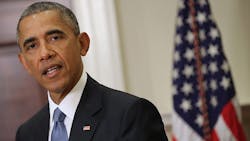Congress Expected to Hand Obama Fast-Track Authority
WASHINGTON, D.C. — After weeks of legislative clashes, Congress will hand President Barack Obama a major policy victory Wednesday, giving him authority to rapidly conclude a Pacific trade accord vehemently opposed by many in his party.
Bucking political tradition, the Democratic president is relying on his Republican rivals to realize the top economic priority of his second term: creating a 12-nation trans-Pacific free-trade area aimed at opening new markets for U.S. exports in countries like Japan, Chile, Australia and Vietnam.
Obama's own party has rebelled, worried about a repeat of the 1990s North American Free Trade Agreement (NAFTA), which led to large numbers of manufacturing jobs going to Mexico where labor costs were dramatically lower.
But after a major trade package including the trade promotion authority legislation stalled in Congress last week, the White House and Republican leaders secured the necessary votes to advance at least the TPA measure.
The Senate votes around 4:30 EDT Wednesday on final passage of TPA, a so-called "fast-track" mechanism that allows Obama, and his successor, to negotiate trade deals and present them to Congress for a simple up or down vote, with no opportunity for lawmakers to make changes.
The House of Representatives narrowly passed the measure last week, and it would remain valid until 2021, despite furious opposition by most Democrats.
"We had plenty of bumps along the road — frankly a few big potholes too," Senate Majority Leader Mitch McConnell said. "But we worked across the aisle to get through all of them."
The resistance to the trade pact comes mainly from traditional Democratic allies: organized labor, environmental groups, and human rights organizations, many of whom warn it could trigger a "race to the bottom" on wages and jeopardize environmental and rights standards.
The mechanism for resolving disputes between states and multinational corporations is also a major sticking point in the negotiations between Washington and Brussels as the United States and European nations hash out a huge transatlantic trade deal.
Fast-track authority is not new. Every president in the last 40 years has used it, and it will allow Obama to guarantee trading partners that the Trans-Pacific Partnership (TPP) will not be carved up in Congress.
In the shadow of Bill Clinton and NAFTA
"With NAFTA, we were promised 200,000 jobs in two years. Thank you, President Bush 1, and thank you, President Clinton, for that. We lost 680,000 net jobs," said Senator Sherrod Brown, the Democrat leading the charge against TPA, citing a study from the progressive Economic Policy Institute.
Obama and "pro-trade" Democrats say a new TPA would make improvements, notably through its 150 negotiating objectives including on intellectual property, labor and human rights, and transparency.
The administration will have to publish the full text of any trade accord 60 days before Congress can vote on it.
While President Clinton in 1993 promised that NAFTA would create a new global economic order, Obama insists that with the Pacific accord, the United States and its allies will be writing the new global trade rules rather than China.
The free-trade debate does not end Wednesday; other measures in a broader trade package will receive votes as early as this week. The issue also will carry into the 2016 presidential campaign, particularly among Democrats.
Pressed by liberal independent Senator Bernie Sanders, who is fervently opposed to the trade deal, Democratic frontrunner Hillary Clinton suggested last week that she would have voted against granting fast-track authority. But she has refrained from denouncing TPP, an accord she once defended while secretary of state.
By Michael Mathes
Copyright Agence France-Presse, 2015
About the Author
Agence France-Presse
Copyright Agence France-Presse, 2002-2025. AFP text, photos, graphics and logos shall not be reproduced, published, broadcast, rewritten for broadcast or publication or redistributed directly or indirectly in any medium. AFP shall not be held liable for any delays, inaccuracies, errors or omissions in any AFP content, or for any actions taken in consequence.
